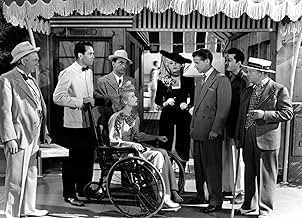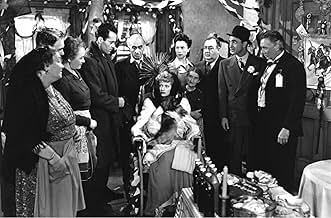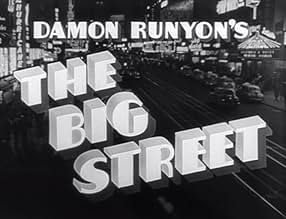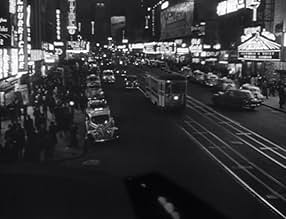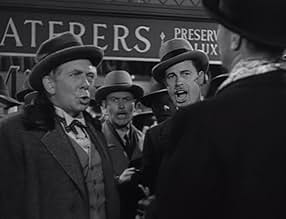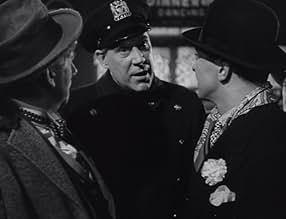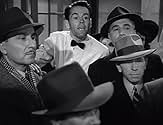NOTE IMDb
6,4/10
1,7 k
MA NOTE
Ajouter une intrigue dans votre langueA busboy in unrequited love with a nightclub performer grows closer to her after she is paralyzed in an attack by her gangster boyfriend.A busboy in unrequited love with a nightclub performer grows closer to her after she is paralyzed in an attack by her gangster boyfriend.A busboy in unrequited love with a nightclub performer grows closer to her after she is paralyzed in an attack by her gangster boyfriend.
- Réalisation
- Scénario
- Casting principal
- Récompenses
- 2 victoires au total
William T. Orr
- Decatur Reed
- (as William Orr)
Don Barclay
- Eating Contest Emcee
- (non crédité)
Mary Bayless
- Nightclub Patron
- (non crédité)
Louise Beavers
- Ruby - Gloria's Maid
- (non crédité)
Anthony Blair
- O'Rourke
- (non crédité)
Avis à la une
For fans of Lucy, Ball's role here takes real getting used to. "Her Highness" character is shrewish and generally not very likable. Ball does, however, get to show some very real chops outside her usual comedic range. As a result, I've got a new appreciation of her as an actress as well as a comedienne.
The movie itself is undermined by a weak central focus. Neither Ball's Her Highness nor Fonda's servile bus boy is easy to identify with. Thus, it's hard to sympathize with the overbearing HH even after she's crippled. Nor is Little Pink's (Fonda) utterly selfless devotion understandable given the imperious way she treats him. As a result, the movie's core flounders. A charitable view might take the movie as a fairy tale where the unlikely bus boy, a prince in his sudden formal wear, rescues the crippled princess if only for a moment.
Of course, being a Damon Runyon creation, there's the usual number of street-smart Broadway mugs. So the margins shine with such colorful types as Palette, Levene, Collins, et al. Also, catch dragon lady Agnes Moorehead in a rare sympathetic role (Shumberg); plus premier eccentric Hans Conreid as the grumpy headwaiter. And for folks interested in 50's TV, there's Wm. T. Orr as handsome socialite Decatur Reed. This is the same Orr who produced many of the popular hour-long TV shows of the late 50's, such as Maverick, 77 Sunset Strip, Lawman, et al. I've seen his name for years, never thinking he might show up on screen.
All in all, the only reason to catch this 80-minute pastiche is for Lucy's surprising performance and the colorful peripheral characters. Otherwise, it's pretty forgettable, especially for fans of Fonda.
The movie itself is undermined by a weak central focus. Neither Ball's Her Highness nor Fonda's servile bus boy is easy to identify with. Thus, it's hard to sympathize with the overbearing HH even after she's crippled. Nor is Little Pink's (Fonda) utterly selfless devotion understandable given the imperious way she treats him. As a result, the movie's core flounders. A charitable view might take the movie as a fairy tale where the unlikely bus boy, a prince in his sudden formal wear, rescues the crippled princess if only for a moment.
Of course, being a Damon Runyon creation, there's the usual number of street-smart Broadway mugs. So the margins shine with such colorful types as Palette, Levene, Collins, et al. Also, catch dragon lady Agnes Moorehead in a rare sympathetic role (Shumberg); plus premier eccentric Hans Conreid as the grumpy headwaiter. And for folks interested in 50's TV, there's Wm. T. Orr as handsome socialite Decatur Reed. This is the same Orr who produced many of the popular hour-long TV shows of the late 50's, such as Maverick, 77 Sunset Strip, Lawman, et al. I've seen his name for years, never thinking he might show up on screen.
All in all, the only reason to catch this 80-minute pastiche is for Lucy's surprising performance and the colorful peripheral characters. Otherwise, it's pretty forgettable, especially for fans of Fonda.
The Big Street (1942)
Packed with great actors, major and minor, in a fast fast whirlwind
First of all, Agnes Moorehead and Ray Collins played the previous year in another raging movie of some fame (Citizen Kane, yup), and here they are loaded up against a dozen other great character actors, plus a couple big names. Headlining is the well known Henry Fonda, still young, but fresh off of a couple great films, Grapes of Wrath (1940), and The Young Mr. Lincoln (1939). But in a kind of startling role for those who know Lucille Ball as a brilliant and goofy t.v. comedian a decade later, we have her here as a big-eyed femme fatale, or would-be femme fatale until fate takes a turn.
You might think this one is a screwball comedy the way it starts, but keep watching-- there is violence and trauma soon enough, and the movie takes a turn that Fonda is worthy of. There is a Frank Capra feel-good element amidst the hardship, but it is full of verve, and all these odd characters who really are (were and are) what New York is at its best. The director Irving Reis (with photographer Russell Metty) keeps the scenes snappy, and sometimes moves from a closeup of a face to a background quickly, to let a character make a dramatic point. There are lots of movie tricks, quick fades from scene to scene to show the passing of time, and some tacky back projection, and it really goes along with the fairy tale narrative.
And there really is an unbelievable ending, which you have to take with the whole flavor of the movie, a kind of sincerity/fantasy mixture.
Packed with great actors, major and minor, in a fast fast whirlwind
First of all, Agnes Moorehead and Ray Collins played the previous year in another raging movie of some fame (Citizen Kane, yup), and here they are loaded up against a dozen other great character actors, plus a couple big names. Headlining is the well known Henry Fonda, still young, but fresh off of a couple great films, Grapes of Wrath (1940), and The Young Mr. Lincoln (1939). But in a kind of startling role for those who know Lucille Ball as a brilliant and goofy t.v. comedian a decade later, we have her here as a big-eyed femme fatale, or would-be femme fatale until fate takes a turn.
You might think this one is a screwball comedy the way it starts, but keep watching-- there is violence and trauma soon enough, and the movie takes a turn that Fonda is worthy of. There is a Frank Capra feel-good element amidst the hardship, but it is full of verve, and all these odd characters who really are (were and are) what New York is at its best. The director Irving Reis (with photographer Russell Metty) keeps the scenes snappy, and sometimes moves from a closeup of a face to a background quickly, to let a character make a dramatic point. There are lots of movie tricks, quick fades from scene to scene to show the passing of time, and some tacky back projection, and it really goes along with the fairy tale narrative.
And there really is an unbelievable ending, which you have to take with the whole flavor of the movie, a kind of sincerity/fantasy mixture.
The comments about the Fonda character having 'no reason' to take the abusive and selfishness of the Ball character makes me wonder if this person ever loved anyone unconditionally. There are many people in this world that take worse than the verbal abuse from the person they love and stay with them their whole lives.
The Ball character was very well done and I don't think I remember Ball being a character like that after this movie. I don't like Lucille Ball as a comedienne, its too bad that she wasn't able to continue as a dramatic actress she would have done well.
But the movie is all about love conquering the selfish...wish it was that way all the time.
The Ball character was very well done and I don't think I remember Ball being a character like that after this movie. I don't like Lucille Ball as a comedienne, its too bad that she wasn't able to continue as a dramatic actress she would have done well.
But the movie is all about love conquering the selfish...wish it was that way all the time.
This interesting story failed to make it big with audiences in its initial release, but is actually a noteworthy picture, nonetheless. This unlikely story has Henry Fonda as Little Pinks, a shy, timid busboy, who's obsessed with Lucille Ball's self-absorbed, mean-spirited torch singer. Despite her poor treatment of him, he continues to worship her. During an argument with her louse of a boyfriend, he (the boyfriend) pushes her down a flight of stairs. Paralyzed and desperate, Gloria moves in with Pinks. The wheelchair-bound diva alienates everyone around her with her anger and venomous commentary. But Pinks doesn't let it bother him. Instead the "odd couple" go on an unusual roadtrip together. He pushes her in her wheelchair all the way to Miami - pretty dumb, really !
Ball is excellent, and in top form. It's great to see her in such an unusual role (see also 1947's "Lured"). Fonda is great, too, as the innocent and smitten young man. And the rest of the cast is good; especially, the always fabulous Agnes Moorehead. Despite a good story and an excellent cast, the plot limps along at points, and the shoddy production value is unignorable. Plus, the whole "Let's push Lucy to Florida in her wheelchair" thing is utterly nuts! However, the final scene is an unforgettable melodramatic moment that is fascinating just for the fact that Ball is the center of it. It makes it worth sitting through the many drawbacks of this film just to see the ending scene.
Ball is excellent, and in top form. It's great to see her in such an unusual role (see also 1947's "Lured"). Fonda is great, too, as the innocent and smitten young man. And the rest of the cast is good; especially, the always fabulous Agnes Moorehead. Despite a good story and an excellent cast, the plot limps along at points, and the shoddy production value is unignorable. Plus, the whole "Let's push Lucy to Florida in her wheelchair" thing is utterly nuts! However, the final scene is an unforgettable melodramatic moment that is fascinating just for the fact that Ball is the center of it. It makes it worth sitting through the many drawbacks of this film just to see the ending scene.
I saw this film in the late '60's on our local TV station. It was not unusual to catch B movies starring our television personalities back in the day. What a film! I cried at the end. What shines through is the portrayal of the class levels within American society then. Lucille Ball's dame certainly internalized the idea that she was above the class of Henry Fonda's Pinky even while she subsisted on the food he brought home for her after she was no longer a gangster's moll. Henry Fonda's Pinky was a true codependent, picking her up from the floor, keeping her alive, even moving her from cold, icy New York City to the east coast Eden of Miami (shades of Midnight Cowboy!)with nary a thank you from this ungrateful woman. Through a plot device, Pinky and the busboys don tuxedos at the end so she condescends to be carried up the stairs by one of their own, enabling her self deceit that she is an upper class lady. Someone wrote it was too much of a downer to have been successful when released and couldn't be made today as the bit players do not exist to round out the cast. Rise above the limitations of both eras and enjoy this film.
Le saviez-vous
- AnecdotesLucille Ball's favorite of her films. She felt her performance was unjustly ignored by the Academy of Motion Picture Arts and Sciences (AMPAS).
- GaffesA gathering to raise money to send Gloria Lyons to Florida doesn't raise enough, so a suggestion is made to put it on a horse. A face-on shot of Horsethief shows him sitting down and pulling a paper from his inside pocket. He stands up and unfolds the paper, but then a long shot shows him just starting to take the paper from his pocket.
- Citations
Gloria Lyons: Love is something that gets you one room, two chins and 3 kids.
- Crédits fousOpening credits: "Loser's Lane --- the sidewalk in front of Mindy's Restaurant on Broadway-- is not as high-toned a trading center as Wall Street, but the brokers are a lot more colorful. Generally they prefer to put their money on a prizefight or horserace, but when the action slows, anything can happen and it usually does. Tonight, for example, the citizens of the Lane are discussing the latest contest in their usual quiet way --"
- ConnexionsFeatured in AFI Life Achievement Award: A Tribute to Henry Fonda (1978)
- Bandes originalesWho Knows?
(1942)
Lyrics by Mort Greene
Music by Harry Revel
Performed by Lucille Ball at the New York nightclub (uncredited)
Reprised by her with Ozzie Nelson and Orchestra at the Florida nightclub (Vocals for Miss Ball by Martha Mears) (uncredited)
Played often in the score
Meilleurs choix
Connectez-vous pour évaluer et suivre la liste de favoris afin de recevoir des recommandations personnalisées
- How long is The Big Street?Alimenté par Alexa
Détails
- Date de sortie
- Pays d’origine
- Langue
- Aussi connu sous le nom de
- The Big Street
- Lieux de tournage
- Miami, Floride, États-Unis(second unit - exteriors)
- Société de production
- Voir plus de crédits d'entreprise sur IMDbPro
- Durée1 heure 28 minutes
- Couleur
- Rapport de forme
- 1.37 : 1
Contribuer à cette page
Suggérer une modification ou ajouter du contenu manquant

Lacune principale
By what name was La poupée brisée (1942) officially released in India in English?
Répondre

